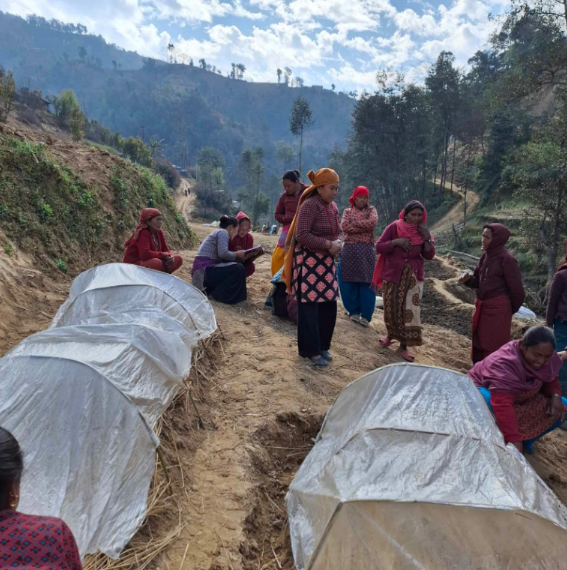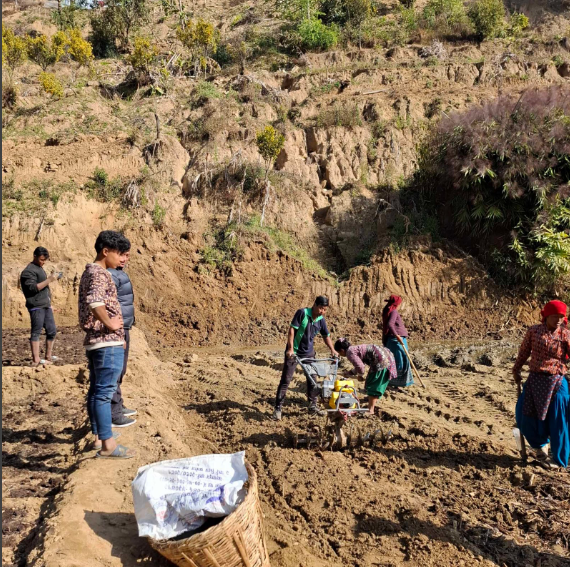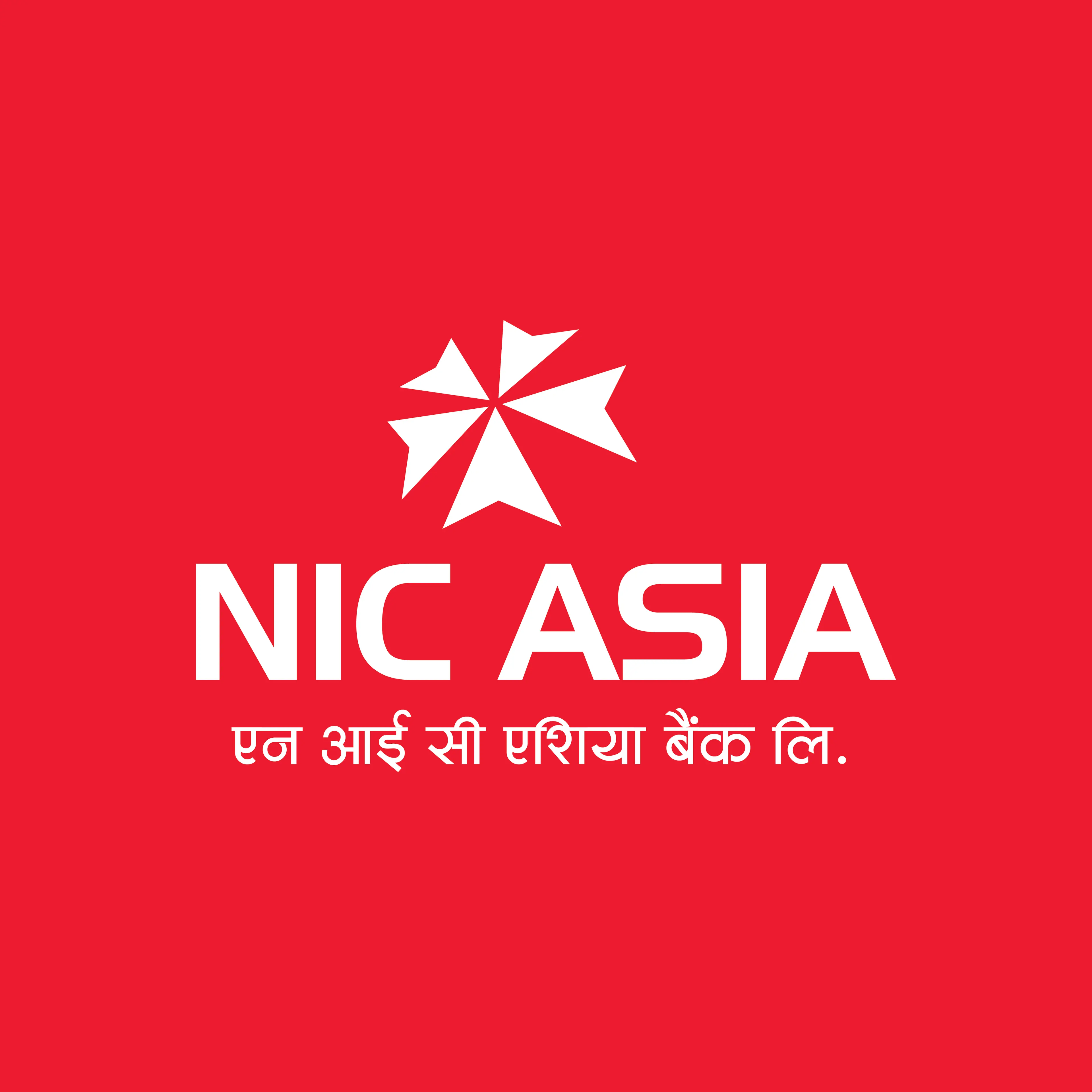
National Indigenous Women Forum (NIWF), with the support from MADRE, has been conducting a transformative 20-week training program on climate adaptation agricultural systems for the women farmers of Bhalukharka. The initiative, which concluded its third session in Bhalukharka, Ward No. 11, Namobuddha Municipality, Kavre, is a key effort to address the pressing challenges posed by climate change while empowering local women farmers to take the lead in fostering sustainable agricultural practices. This comprehensive training program engages 22 women farmers, organized into four groups from across the Bhalukharka area. Running from 28th December 2024 to 10th May 2025, the training is designed to equip participants with practical knowledge, hands-on experience, and the confidence to implement innovative, climate-resilient farming techniques. It also emphasizes strengthening community ties, fostering a safe environment for learning and collaboration, and enhancing the region's overall social and agricultural systems.

The program focuses on bridging the gap between traditional agricultural practices and modern, sustainable farming solutions that are tailored to the challenges of climate change. Participants are introduced to a variety of techniques, including organic farming, water-efficient irrigation systems, integrated pest management, soil health improvement, and crop diversification. These practices aim to mitigate the adverse effects of erratic weather patterns, soil degradation, and water scarcity that increasingly impact farming communities in the region. This 20-week training program stands as a testament to NIWF’s commitment to creating opportunities for Indigenous women to lead and thrive. Through such initiatives, NIWF continues to contribute to building resilient, self-sustaining communities that can adapt to climate challenges while safeguarding their cultural and environmental heritage.




On December 27, 2024, National Indigenous Women Forum (NIWF) and Nepal Federation of Indigenous Nationalities (NEFIN) jointly organized the NBSAP Revision - Nepal Introductory Sharing Event at Indreni Suites Hotel, Kathmandu. This crucial gathering brought together Indigenous leaders, Thematic experts of the NBSAP Technical Committee, Policymakers, and Stakeholders to discuss integrating Indigenous Peoples' rights and knowledge into Nepal's biodiversity conservation strategies. The event featured key presentations from notable speakers, including Indigenous Biodiversity expert, Kamal Sampang Rai, who emphasized the importance of Indigenous Knowledge asytem and practices in conservation efforts.
Dr. KC Poudel, Biodiversity expert and team lead of NBSAP Technical Committee provided updates on NBSAP progress and the integration of Global Biodiversity Framework targets. Ek Raj Sigdel from WWF discussed Other Effective Area-based Conservation Measures (OECM), Similarly, Bibek Sharma from UNDP GEF Small Grants highlighted the importance of documenting best customary practices.

Discussions featured active participation of WWF, IUCN, UNDP, and various Indigenous Peoples' organizations such as YFIN, Kirat Yakthung Chumlung, Kirat Mahasangh, INOWLAG, CIPRED, NIDA, Sunuwar Samaj. The dialogue focused on critical issues, including land rights, human-wildlife conflicts, and the preservation of traditional knowledge systems. Participants emphasized the importance of obtaining Free, Prior, and Informed Consent (FPIC) for conservation projects and advocated for the meaningful inclusion of Intersections of Indigenous People, in decision-making processes. GESI Expert Sunaina Sharma and Climate Change Expert Ripu Kunwar from the NBSAP Technical Committee shared their insights and reaffirmed their commitment to addressing the issues faced by Indigenous Peoples, emphasizing the importance of recognizing intersectionality in these challenges. Rajendra Dhungana, Focal point of CBD from the Department of Environment and Biodiversity, Ministry of Forests and Environment, shared insightful remarks on the government's priorities for biodiversity conservation and their plan of calling a IPLCs committee under the secretariat. The closing remarks, delivered by the Chair of NIWF and the Indigenous Peoples' representative to the NBSAP Steering Committee, Suni Lama, concluded the event with a key suggestion to the NBSAP technical committee, to ensure the provisions relevant to the connection of Indigenous Women’s rights and contribution in biodiversity preservation ensured by CEDAW General Recommendation 39 is not overlooked and to prioritize meaningful engagement and consultation with Indigenous Women’s throughout the process.

This dialogue marks a significant step towards ensuring that Nepal's National Biodiversity Strategy and Action Plan (NBSAP) aligns with the Kunming-Montreal Global Biodiversity Framework while honoring Indigenous knowledge and rights.
On December 21, 2024, the National Indigenous Women’s Forum (NIWF) with the support from MADRE conducted a relief distribution program to support families severely affected by floods and landslides in Temal Rural Municipality, Kavrepalanchowk District. The program, led by NIWF Chairperson Ms. Suni Lama, Treasurer Ms. Sushila Gole and Field Coordinator Ms. Sanila Lama, provided corrugated sheets to 15 households in Pokhari Narayansthan, Ward No. 5, and Maure, Ward No. 4. This initiative aimed to aid the rehabilitation of vulnerable families who suffered significant losses due to the recent natural disaster.

The distribution was part of NIWF’s ongoing commitment to supporting Indigenous and Marginalized Communities in times of crisis. The devastating floods and landslides, triggered by continuous rainfall in September, caused widespread destruction across Nepal, leading to the loss of lives, homes, and livelihoods. In Temal Rural Municipality, where many Indigenous families reside, the impact was particularly severe, with homes destroyed and essential resources lost. Recognizing the urgent need for rehabilitation support, NIWF prioritized providing corrugated sheets, a vital resource for rebuilding damaged homes and shelters. These materials will help the affected families restore basic living conditions and protect themselves from harsh weather conditions. The distribution process was carried out with sensitivity and ensured that the most vulnerable households, including those led by women, elderly members, or individuals with disabilities, were prioritized.

The relief distribution in Temal Rural Municipality is part of NIWF’s broader strategy to respond to disasters and advocate for sustainable recovery efforts. By addressing immediate needs while fostering long-term resilience, NIWF aims to empower communities to recover from disasters and rebuild stronger. This initiative reflects NIWF’s unwavering commitment to supporting Indigenous families, especially during times of adversity.
On December 19, 2024, the National Indigenous Women Forum (NIWF) participated in a landmark meeting held at Singha Durbar, hosted by the Committee on Women and Social Affairs. This high-level program was dedicated to discussing the implementation of CEDAW General Recommendation No. 39, which specifically addresses the rights, protection, and empowerment of Indigenous Women and Girls. The program began with a detailed presentation by Ms. Chanda Thapa Magar, who provided an in-depth explanation of CEDAW General Recommendation 39, its context, and its relevance to the lives of Indigenous Women and Girls in Nepal. She emphasized the critical need for the recommendation to be integrated into national policies and programs to combat intersectional discrimination and systemic inequalities faced by Indigenous communities. Her presentation highlighted how the recommendation calls for the recognition of Indigenous Women and Girls as distinct groups requiring targeted measures to address their unique needs and challenges.

Following her presentation, an interactive discussion session took place, with active participation from members of Parliament, policymakers, and representatives of various ministries. Parliamentarians engaged in a thoughtful exchange of ideas, exploring the implications of General Recommendation 39 and debating actionable strategies to implement its provisions effectively. They discussed key areas such as access to education, healthcare, economic opportunities, and protection from violence, all within the broader framework of advancing gender equality and social inclusion. A notable highlight of the meeting was the commitment expressed by the Secretary of the Ministry of Women, Children, and Senior Citizens. In a powerful statement, the Secretary reaffirmed the ministry’s dedication to implementing the Convention on the Elimination of All Forms of Discrimination Against Women (CEDAW) and its general recommendations, including Recommendation 39. This declaration signifies a positive and encouraging step forward in addressing the systemic barriers that Indigenous Women and Girls face in their daily lives. It also represents a vital acknowledgment of the government’s role in fostering inclusivity and equity for all marginalized groups.

By focusing on the practical application of international human rights standards, this event aimed to shape policies and strategies that ensure the empowerment, inclusion, and overall well-being of Indigenous Women and Girls in Nepal. The meeting not only reinforced the significance of CEDAW General Recommendation 39 but also served as a testament to the growing recognition of the critical role Indigenous Women and Girls play in shaping a more equitable and inclusive society. Through collaborative efforts and continued dialogue, the program set the stage for meaningful progress in addressing the systemic challenges faced by marginalized Indigenous communities and advancing their rights and opportunities in Nepal.
On December 18, 2024, the National Indigenous Women Forum (NIWF) and the Nepal Federation of Indigenous Nationalities (NEFIN) co-hosted a significant event to reflect on and share the key outcomes from the 16th Conference of the Parties to the Convention on Biological Diversity (CBD COP 16) and the 29th Conference of the Parties to the United Nations Framework Convention on Climate Change (UNFCCC COP 29). This gathering brought together a diverse range of participants, including Indigenous leaders, activists, representatives from civil society organizations, and youth advocates, all united in their commitment to advancing Indigenous perspectives on biodiversity and climate action. The program, chaired by NEFIN Chairperson Mr. Gelje Lama, opened with a warm welcome address from NIWF Chairperson Ms. Suni Lama. She highlighted the importance of such platforms for reflecting on global discussions and their implications for Indigenous communities in Nepal and beyond. The event was structured to ensure a dynamic exchange of experiences, with participants sharing their learnings from the global COP sessions and offering critical reflections on the state of Indigenous engagement in these high-level international negotiations.

Mr. Kamal Sampang and Mr. Tunga Bhadra Rai delivered detailed updates on the biodiversity and climate crisis discussions that took center stage at COP 16 and COP 29. Their presentations underscored the urgency of addressing the intertwined challenges of biodiversity loss and climate change, particularly through the lens of Indigenous knowledge systems and traditional practices. They emphasized the need for increased recognition of Indigenous rights and contributions in the global frameworks designed to combat these crises. Representatives from several Indigenous organizations, including CIPRED, LAHURNIP, NIDWAN, and NIWF, shared their direct experiences from participating in COP 16 and COP 29. CIPRED and NIDWAN, represented by young Indigenous advocates, emphasized the critical importance of increasing youth participation from South Asia in these global forums. They shared inspiring stories of their involvement in negotiations and side events, advocating for the inclusion of Indigenous and youth voices in global policy-making processes. NIWF’s representatives reflected on their engagements at COP 29, highlighting the importance of weaving Indigenous women’s voices into discussions on climate resilience and biodiversity conservation. Mr. Diwas Rai and Mr. Buddha Gharti provided additional perspectives, enriching the dialogue with their personal experiences and observations from COP 29. Their inputs shed light on the challenges and opportunities for Indigenous communities to strengthen their advocacy and mobilize collective action in these global spaces.

The program also featured an informative session by Mr. Dev Kumar Sunuwar, who offered comprehensive insights into the UN Voluntary Fund. He detailed its purpose, application process, and how it has been instrumental in enabling Indigenous representatives to participate in global forums such as the COP sessions. His presentation encouraged more Indigenous leaders and organizations to utilize this resource to amplify their voices on the global stage. This collaborative event served as a vital platform for diverse stakeholders to exchange experiences, foster collective action, and strengthen collaboration on pressing biodiversity and climate change issues from an Indigenous perspective. By bringing together key voices and experiences, the program aimed to amplify Indigenous contributions to global environmental discussions and advocate for more inclusive approaches to tackling climate and biodiversity challenges. Moreover, the event underscored the need for continuous capacity-building, resource mobilization, and networking among Indigenous communities to ensure their meaningful participation in global forums. It also highlighted the role of Indigenous knowledge systems as vital tools for addressing the dual crises of climate change and biodiversity loss. Through this reflection and sharing session, NIWF, NEFIN, and their partners reaffirmed their commitment to advancing the rights and well-being of Indigenous peoples while promoting sustainable and equitable solutions to global environmental challenges.
On December 15, 2024, National Indigenous Women Forum (NIWF) organized an impactful program dedicated to discussing and promoting CEDAW General Recommendation 39 (GR 39). The event, held in , aimed to advance the rights of Indigenous Women and Girls and foster accountability for the implementation of GR 39 at both the national and local levels. This landmark event was facilitated by Ms. Man Maya Tamang, General Secretary of NIWF, whose expertise and commitment to Indigenous rights set the tone for the day’s discussions. The program was graced by the presence of Hon. Nawal Kishor Shah Sudi, Minister for Women, Children, and Senior Citizens, as the Chief Guest. Hon. Kiran Kumar Shah, Chairman of the Women and Social Affairs Committee, attended as the Special Guest, alongside other distinguished guests, including members of the Women and Social Affairs Committee, Mr. Diwas Rai, General Secretary of the Nepal Federation of Indigenous Nationalities (NEFIN), Ms. Indira Shreesh, Chairperson of the Indigenous Woman Legal Awareness Group (INWOLAG), and other prominent experts on Indigenous issues. The collective presence of government officials, policymakers, and representatives from Indigenous organizations underscored the significance of the event.

The highlight of the program was an insightful and comprehensive presentation delivered by Ms. Rukmani Maharjan, Advisor to NIWF. Her presentation delved deeply into the significance of CEDAW General Recommendation 39, providing a thorough overview of its implications for the rights of Indigenous Women and Girls. Ms. Maharjan highlighted the critical role GR 39 plays in addressing systemic challenges faced by Indigenous communities, such as discrimination, lack of access to resources, and exclusion from decision-making processes. She emphasized that GR 39 serves as a powerful tool for ensuring justice, equity, and inclusion for Indigenous Women in Nepal and around the world. Hon. Nawal Kishor Shah Sudi, in his keynote address, applauded the progress Nepal has made over the years in advancing women’s rights. He emphasized the importance of recognizing these achievements while adopting a forward-looking approach to address persistent challenges. The Minister reiterated the government’s commitment to fulfilling its obligations under international frameworks, including CEDAW, and pledged to work closely with organizations like NIWF to promote the rights of Indigenous Women and Girls. His speech resonated with optimism and a call for collaboration among all stakeholders. Hon. Kiran Kumar Shah, Chairman of the Women and Social Affairs Committee, added his voice to the dialogue by emphasizing the importance of legislative and policy-level reforms to uphold the principles of GR 39. He called for stronger accountability mechanisms to ensure that the rights enshrined in CEDAW are realized in practice, particularly for marginalized communities like Indigenous Women.

On 10th December 2024, in celebration of 76th International Human Rights Day, a vibrant rally was organized in Kathmandu, starting from Bhrikuti Mandap and ending at Shantivatika. The event brought together representatives from various organizations, uniting under the shared commitment to promote and protect human rights for all. Participants carried banners emphasizing the importance of equality, dignity, and justice. National Indigenous Women Forum (NIWF) proudly joined the rally, representing the voices of Indigenous Women and Girls. The rally served as a powerful platform for solidarity, raising awareness about the urgency to uphold human rights in every sphere of society, in line with this year’s theme, "Our Rights, Our Future, Right Now."

Ms. Suni Lama, Chairperson of NIWF, delivered an inspiring speech on behalf of Indigenous organizations. Her words resonated deeply with the attendees, reinforcing the rally’s message of inclusivity and justice.

NIWF actively participated in the Human Rights Exhibition at the National Human Rights Commission's Harihar Bhawan premises. During the exhibition, NIWF presented various materials, shared information about its ongoing efforts in the field of human rights, and promoted products made by Indigenous Women groups trained through NIWF’s programs.

On December 9, 2024, National Indigenous Women Forum (NIWF), with the support from MADRE, organized a Digital Security Training Program aimed at protecting Indigenous Women’s rights in the digital space. This program was a vital response to the growing need for digital literacy and security among Indigenous Communities, especially as they face increased risks in an interconnected digital world. The training was specifically tailored to empower NIWF’s Board Members, General Members, and Staff, equipping them with the necessary tools to safeguard their digital presence and ensure the security of sensitive information related to their advocacy work.

The training was expertly facilitated by Dr. Rajiv Subba, cybersecurity expert who brought his wealth of knowledge and experience to the session. The program covered a wide array of critical topics, all of which were designed to provide participants with a comprehensive understanding of digital threats and effective strategies to mitigate them. Participants learned about cybercrime, gaining insights into its various forms and the specific ways it affects marginalized communities, including Indigenous Women. Dr. Subba also introduced participants to phishing attempts and demonstrated how to recognize and avoid these deceptive tactics, which are often used by cybercriminals to extract sensitive personal or organizational information. In addition to phishing, the training focused on identifying spam emails—a prevalent form of digital threat that can compromise the security of devices and personal data. Participants were guided through practical examples to help them differentiate between legitimate and malicious communications. Another key component of the training was the secure use of Virtual Private Networks (VPNs). Dr. Subba explained how VPNs can be effectively used to ensure safe internet access. Beyond theoretical knowledge, the program incorporated hands-on activities and interactive sessions, allowing participants to put their new skills into practice. These exercises provided an opportunity to apply the lessons learned to real-world scenarios, ensuring that participants left the session equipped with actionable strategies to tackle digital threats effectively.

This initiative reflects NIWF’s commitment to strengthening Indigenous Women’s resilience in the face of evolving challenges while fostering a safe and inclusive digital environment for their advocacy and empowerment.
From December 2 to 5, 2024, National Indigenous Women Forum (NIWF) participated in the Association for Women's Rights in Development (AWID) Forum 2024, a global event held to celebrate and advance feminist and women’s rights movements worldwide. Representing NIWF at this prestigious gathering were Chairperson Ms. Suni Lama, Treasurer Ms. Sushila Gole, Executive Director Ms. Dwarika Thebe, and prominent Community Leader Ms. Junta Waiba.













